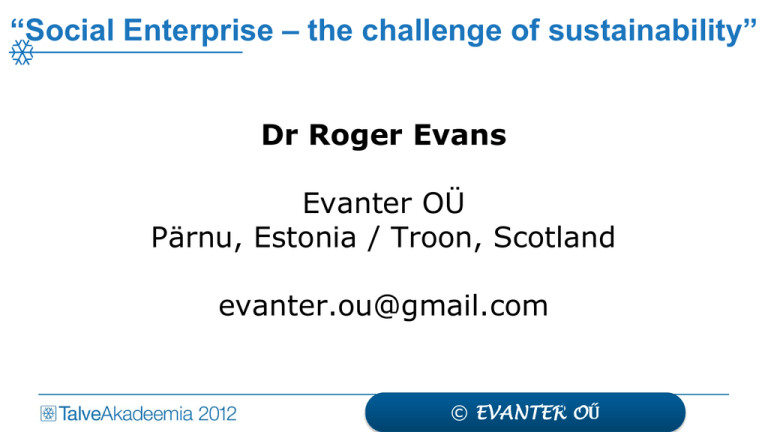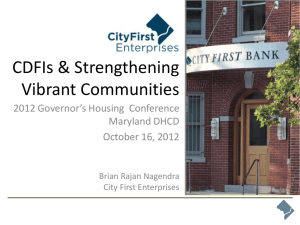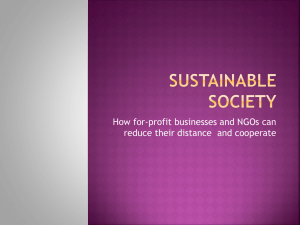What is social enterprise?
advertisement

“Social Enterprise – the challenge of sustainability” Dr Roger Evans Evanter OÜ Pärnu, Estonia / Troon, Scotland evanter.ou@gmail.com © EVANTER1 OŰ Defining Social Enterprise Defining Social Enterprise: The meaning of the term social enterprise as used by organisations promoting social enterprise: • networks & companies • government • agencies © EVANTER OŰ 2 What is social enterprise? • Social enterprises are businesses driven by a social or environmental purpose. • The UK government defines and describes social enterprise as follows: "A social enterprise is a business with primarily social objectives whose surpluses are reinvested for that purpose in the business or in the community, rather than being driven by the need to deliver profit to shareholders and owners." © EVANTER OŰ 3 What is social enterprise? A more simple definition is: • a social enterprise is an organisation that trades for a social purpose. Sometimes social enterprises are described as 'not for profit' as any profit or surplus generated is used to further the social objectives of the business. © EVANTER OŰ 4 Social enterprises are extremely varied All have commercial earned income and social objectives, but the form is adaptable, with different types of social enterprises developing in response to different sets of circumstances. They can be distinguished by their: • purpose and social objectives; • ownership; • management structures and cultures; • activities; and • membership, democratic processes or accountability. © EVANTER OŰ 5 Social Enterprise – the alternative bottom line • Traditional Business – one bottom line • Social Enterprise – up to 4 bottom lines – Social: improving the quality of life, access to services, and so on for communities – Environmental: minimising the enterprise’s own negative impacts, making improvements – Economic: increasing employment rates, income levels, business start-ups, etc – Financial: generating income and profits to be invested in the other bottom lines © EVANTER OŰ 6 Social Enterprise – alternative definitions 1 – Social Enterprises have social and/or environmental objectives. As one of its defining characteristics, a social enterprise must be able to demonstrate its social mission. 2 - Social Enterprises are trading businesses aspiring to financial independence. This second defining characteristic is demonstrated by an enterprise earning 50% or more of its income from trading. 3 – Social Enterprises such as CICs have an ‘asset lock’ on both trading surplus and residual assets. Whether or not it’s a charity, a social enterprise re-invests all its distributable profit for the purpose of its social mission. © EVANTER OŰ 7 Social Enterprise – alternative definitions 4 – A Social Enterprise cannot be the subsidiary of a public sector body. Whilst a social enterprise can be the trading subsidiary of a charity, it must be constitutionally independent from the governance of any public body. 5 – Social Enterprises are driven by values – both in their mission and business practices. Social enterprises operate in competitive - often fierce – markets but there is an expectation that their dealings will be ethical and that they will offer their people satisfactory wages, terms and conditions. © EVANTER OŰ 8 Types of social enterprise Legal structure is often viewed as helping to define a SE, but this is complicated by international variations in • Legal formats, • Frameworks, • Terminology • Financial responsibilities and duties, which makes international comparisons and comparative research difficult. It is also argued that purpose rather than structure defines a SE and in practice the choice legal structure can be somewhat arbitrary. © EVANTER OŰ 9 Types of social enterprise • It can be said that the majority of social enterprises in Europe are still operating in a traditional third-sector legal environment. • In countries where associations are more limited in this regard, such as the Nordic countries, social enterprises are more often created under the legal form of cooperatives. • In Italy, a new cooperative legal form – that of social cooperative (cooperativa sociale) – was introduced in 1991 • Other countries followed the Italian example. Portugal, for example, created the ‘social solidarity cooperatives’ (cooperativas de solidariedade social). © EVANTER OŰ 10 Types of social enterprise • The French ‘cooperative society of collective interest’ (société coopérative d’intérêt collectif, or SCIC), was introduced in 2001. Another trend has been gaining speed more recently: that of introducing more general legal frameworks for social enterprises. This trend first appeared in Belgium, where the ‘social purpose company’ (société à finalité sociale in French, vennootschap met sociaal oogmerk in Dutch) was introduced in 1995. © EVANTER OŰ 11 Types of social enterprise In Italy and the UK have similar trends: the expansion of the set of activities • supplying general interest services other than welfare provisions including: • cultural and recreational services; • activities aimed at protecting and regenerating the environment; • services aimed at supporting the economic development of specific communities. Under Italian law, a social enterprise is defined as a non-profit private organization, which permanently and principally carries out an economic activity aimed at the production and distribution of goods and services of social benefit, and pursues general interest goals. © EVANTER OŰ 12 Types of social enterprise In the UK the new ‘community interest company’ (CIC) is for enterprises that want to use their profits and assets for social benefit, There are a number of specific legal structures that are most commonly associated with Social Enterprises including: • a Charity (that trades), • Trust, • Community Interest Company (CIC), • Company Limited by Guarantee, • Company Limited by Shares, • Industrial and Provident Society • Community Benefit Society, • Unincorporated Association. © EVANTER OŰ 13 Types of social enterprise The definitions and legal structures applied to SEs may seem to be an ‘academic’ question without practical value. Research into the issue suggests that SEs’ reasons for picking a particular structure are influenced by factors including: perceived tax advantages, access to grant funding, enabling cross-subsidy between trading divisions, retaining management autonomy and risk management. © EVANTER OŰ 14 Types of social enterprise Types of SE according to activity 1. 2. 3. 4. 5. 6. 7. Social Firms Co-operatives Development trusts Intermediate labour market companies Community business Credit unions Charities trading branch/subsidiary © EVANTER OŰ 15 Types of social enterprise © EVANTER OŰ 16 Types of social enterprise © EVANTER OŰ 17 Types of social enterprise © EVANTER OŰ 18 The social economy © EVANTER OŰ 19 The social economy © EVANTER OŰ 20 The social economy © EVANTER OŰ 21 The social economy The term social economy or Third Sector was adopted from the French economie sociale, and describes the sector of the national economy occupied by associations, trade unions, co-operatives, mutual societies and other forms of not-for-profit organisation as distinct from the public and private sectors. In France and most other European countries there is no equivalent to UK charity law but charities also contribute hugely to this sector of the economy. The social economy is composed of: • social enterprises • Charities • voluntary organisations • community groups • other not-for-profit organisations. © EVANTER OŰ 22 The social economy The term social economy or Third Sector was adopted from the French economie sociale, and describes the sector of the national economy occupied by associations, trade unions, co-operatives, mutual societies and other forms of not-for-profit organisation as distinct from the public and private sectors. In France and most other European countries there is no equivalent to UK charity law but charities also contribute hugely to this sector of the economy. The social economy is composed of: • social enterprises • Charities • voluntary organisations • community groups • other not-for-profit organisations. © EVANTER OŰ 23 The social economy Although each type of organisation has a distinct identity, it can overlap with the other types. For instance: • the majority of voluntary organisations, so called because of their use of volunteer workforces, are registered charities. • Many community groups are charities and also use volunteers. • Some social enterprises are community-based, use volunteers and are registered charities. © EVANTER OŰ 24 The social economy: economic principles The social economy includes three distinct and sometimes conflicting economic principles: • Altruism: • self-help: • Trade: © EVANTER OŰ 25 Six main ways to become a social enterprise 1. Community regeneration 2. Employee buyout 3. Local authority externalisation of services 4. Individual social entrepreneur 5. Voluntary organisation transformations 6. Voluntary organisation spin-offs and this means starting a business- entrepreneurship! © EVANTER OŰ 26 Motivation to build a Business Classified into 2 broad types: 1. PULL FACTORS 2. PUSH FACTORS © EVANTER OŰ 27 Drawbacks of running your own business An entrepreneur: – a person who organizes and manages any enterprise, especially a business, usually with considerable initiative and risk. • Uncertainty of Income • Risk of Losing Capital • Lower Quality of Life • Complete Responsibility © EVANTER OŰ 28 Start-up or Diversification? – “The practice of varying products, operations, etc. in order to spread risk, expand, exploit spare capacity, etc.” (Collins English Dictionary, 1994) – the act or practice of manufacturing a variety of products, investing in a variety of securities, selling a variety of merchandise, etc., so that a failure in or an economic slump affecting one of them will not be disastrous (Random House Dictionary 2009) © EVANTER OŰ 29 Diversify- why, what benefits? • • • • • • • • growth or business expansion adding value and improve business profitability Use surplus or available resources provide more employment eg. for family alternative source of income - survival! possibility to grow and get better returns hobby / personal interest government or EU support schemes and grants © EVANTER OŰ 30 Diversification For Against New business – more income May divert resources from core business New/wider range of customers May take too much time Uses surplus resources or labour Needs funding to start up Can grow the business Could be risky if little experience Wider product range – less risk © EVANTER OŰ 31 How do Social Enterprises differ from Commercial Enterprises? • A Social Enterprise through the nature of its origins has a specific understanding of local society and local economy • The Social Enterprise Sector has a vital role to play in helping grow a local economy. It can help in delivering excellent public and local services and supporting stronger communities © EVANTER OŰ 32 How do Social Enterprises differ from Commercial Enterprises? The Social Enterprise Sector usually has a triple or quadruple bottom line: 1.Social Benefits 2.Economic Benefits 3.Environmental Benefits 4.Financial Benefits © EVANTER OŰ 33 Challenges to starting a social enterprise 1. SE’s have the same obstacles as commercial enterprises 2. they also involve balancing the needs of the community with the commercial imperative of earning sufficient income to: a. b. pay for operating costs and generation of surpluses for reinvesting in community activities. © EVANTER OŰ 34 Drawbacks to starting a social enterprise: • Uncertainty of income for community stakeholders • Risk of losing capital for all investment stakeholders • Lower quality of life for owner managers while the company becomes established • Complete responsibility for business activities for owners, managers and community taking on managerial responsibilities © EVANTER OŰ 35 Drawbacks to starting a social enterprise: Factors that influence business failure include: • • • • • • Weak idea Poor management Unfavourable economic conditions Inappropriate type of company structure Poor location Over reliance on state or other subsidies to cover running costs. © EVANTER OŰ 36 Drawbacks to starting a social enterprise: These factors may also be compounded by poor preparation and planning including: • Poor or inadequate market research lacking in-depth analysis of specific market segments • Excessive secrecy in developing the business ideas, limited external evaluation and advice/comment • Lack of planning for development of client base or marketplace for the products/services • Lack of capital • Lack of a contingency plan © EVANTER OŰ 37 What makes a successful start-up? 1. 2. 3. 4. 5. 6. 7. 8. Motivation & determination Idea & market Ability & experience Support- family, local, national Good communication Administration plus possibly good support from a board Resources Good planning © EVANTER OŰ 38 Factors that influence failure • Weak Idea • Management • Economic conditions • Type of Firm • Location • Businesses receiving state subsidies © EVANTER OŰ 39 Common problems encountered by new businesses • Poor or inadequate market research • Lack of in-depth market research • Keeping your business ideas to yourself • Not knowing your clients or marketplace • Lack of capital • Lack of a contingency plan • Poor cash-flow © EVANTER OŰ 40 Common problems encountered by new businesses • Setting sights too high • Focusing on sales volume or size not profit/surpluses • Setting up poor supplier contracts • Poor stock control • Over-investing in fixed assets • Hiring the wrong people © EVANTER OŰ 41 Overcoming these challenges • Education / Information – Education in diversification through courses, examples, demonstrations – Train entrepreneurs, financiers, politicians to new and creative thinking in social enterprise – More research into new diversified systems – Provide better access to information – • Management Solutions – Work jointly rather than in competition - support each other – Take risk on one prototype area © EVANTER OŰ 42 Overcoming these challenges • Financial / Economic Solutions – Develop support for individuals trying new options – Provision of start-up grants / advice – Have loans guaranteed by public sector – • Individual Attitudes – Keep an open mind and be willing to experiment – Accept failures – Trust others © EVANTER OŰ 43 Successful business start-up Happens when: • they like what they are doing and get family or relatives involved • There is a real market demand • The product / service is of high quality • They start small, plan well and grow naturally • They have good market information on which to make decisions and keep good business records • They can create a loyal customer base • You are future oriented © EVANTER OŰ 44 How to become a better risk-taker • Being a risk-taker is vital, whether in business, or just in life. • Being a better risk-taker will affect everything from product design, your sales and marketing, and the journey you take. • We think our tolerance for risk is something we are born with, but it is never too late to learn to increase your tolerance for risk. © EVANTER OŰ 45 Assertiveness • Being assertive is a hard thing to do well. – It is not about becoming a tyrant. – It is about having a deep-seated belief in your own worth. • Confidence • Don’t undersell yourself • Learn to say ‘no’ © EVANTER OŰ 46 Success factors in Scottish social enterprise In a recent study on success factors in social enterprises the Scottish Government identified a number of key issues surrounding the concept of success in social entrepreneurship © EVANTER OŰ 47 Success factors in Scottish social enterprise Social enterprise leaders tended to identify success in terms of achievement including: •delivering on objectives achieving outcomes and changing lives and communities whilst at the same time•maintaining the financial viability of the company. © EVANTER OŰ 48 Success factors in Scottish social enterprise The research showed clearly that successful SE’s need to possess many of the characteristics of strictly commercial companies: 1. a clear and shared social mission; 6. systems that ensure operational 2. strong and inspiring leadership; excellence; 3. close alignment with stakeholder 7. an entrepreneurial streak and strong and market needs; business awareness; 4. a product of value to others; 8. a culture of learning, openness, and 5. effective relationships; innovation; 9. a sustainable scale and income base 10. a strong grasp of the finances. © EVANTER OŰ 49 Success factors in Scottish social enterprise Scottish Enterprise (2005) identified 14 characteristics that define successful businesses (i.e. those that are able to compete and grow), which might also be applied to SEs: 1/ able to manage change 8/ committed to innovation 2/ active networkers 9/ active in their uptake and use of ICT 3/ customer aware and focused 10/ possess detailed market knowledge 4/ committed to continuous improvement 11/ active in promoting learning 5/ entrepreneurial in culture 12/ able to establish a strong asset base 6/ environmentally and socially 13/ strategic thinkers & long-term planners responsible 14/ visionary in their leadership 7/ global in their outlook © EVANTER OŰ 50 Thank You © EVANTER OŰ 51









